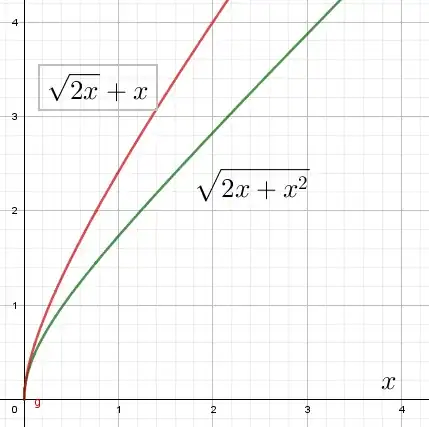I just don't get why this isn't true.
-
4Why should they be the same? To convince yourself that they are different, try particular values of $x$, like $x=1$. – lulu Apr 17 '19 at 21:43
-
3For the same reason that $\sqrt{3^2+4^2}=5$ is not the same as $\sqrt{3^2}+\sqrt{4^2}=7$ – Henry Apr 17 '19 at 21:43
-
Why don't you try to do the opposite? Solve the equation $\sqrt{2x+x^2} = \sqrt{2x} + x$ and determine for which values of $x$ does the equation hold... You will see that $x=0$ is the only solution! – PierreCarre Apr 17 '19 at 21:53
-
@Ethan makes a good point. Another point to consider is that, in general, $$\left(x^2\right)^\frac12=|x|.$$ – Cameron Buie Apr 17 '19 at 23:10
8 Answers
let $y=(2x+x^2)^{0.5}$. And $z=(2x)^{0.5} +x$. Then $y^2=2x+x^2$ and $z^2 =((2x)^{0.5}+x)^{2}$. Then it should be clear that $z$ can not be equal to $y$ since the well defined operations do not match. Therefore, you can not define it that way.
- 2,357
Taking a power of something isn't a linear operation
- 3,916
-
2+1, absolutely correct, but I am afraid will be totally lost on the OP... – gt6989b Apr 17 '19 at 21:45
Why should it be true. other than wishful thinking? When you first learn algebra you remember the distributive law for "multiplication by a fixed constant $a$", namely $$ a(x + y) = ax +ay . $$ That is true because you can prove it, first for integers and then for any real numbers.
But, sadly, $$ (x + y)^2 \ne x^2 + y ^2 \\ $$ $$ \sqrt{x + y} \ne \sqrt{x} + \sqrt{y} $$ $$ a^{x + y} \ne a^{x} + a^{y} $$ $$ \log(x + y) \ne \log{x} + \log{y} $$ $$ \sin(x + y) \ne \sin{x} + \sin{y} $$
See
- 95,224
- 7
- 108
- 199
-
law of universal linearity is a great phrase ... I'm stealing that. – Rushabh Mehta Apr 17 '19 at 23:20
You have $$ \sqrt{2x + x^2} = \sqrt{x(2+x)} = \sqrt{x} \sqrt{2+x} $$ but in general, $$ \sqrt{a+b} \ne \sqrt{a} + \sqrt{b}. $$ Suppose this "equality" indeed held, then squaring both sides yields $$ a+b = a + b + 2\sqrt{ab} \iff \sqrt{ab} = 0 $$ So you can see either $a=0$ or $b=0$ are needed for your "equality" to hold...
- 54,422
-
I used to give this kind of argument, but what if the student mistakenly thinks $(a+b)^2=a^2+b^2$? Then your argument just shows $a+b=a+b$ and the student will think they are correct... (Of course, some assumptions are being made on the parts of $a$ and $b$, but when thinking like a student, I don't find it unwarranted). – Clayton Apr 17 '19 at 22:10
-
1Then they should be taught that $(a+b)^2=(a+b)(a+b)$ and how to expand that out. – Rhys Hughes Apr 17 '19 at 22:25
-
@RhysHughes "Multiply that out" using the distributive law, not "factor that out". – Ethan Bolker Apr 17 '19 at 22:26
-
I corrected it to "expand" before your comment. Factor is the inverse and I realised this just after I wrote the comment – Rhys Hughes Apr 17 '19 at 22:27
Square both, you see:
$$(\sqrt{2x+x^2})^2\equiv(\sqrt{2x}+x)^2$$
$$2x+x^2\equiv(\sqrt{2x}+x)(\sqrt{2x}+x)\equiv2x+x^2+2x\sqrt{2x}$$ $$\implies 0\equiv2x\sqrt 2x$$ which is clearly false.
- 12,842
Hint: Test the equation with $x=1$. You will see that your equations give different results. The square root is the inverse of the square operator. It is clear that $(a+b)^2\neq a^2 + b^2$ hence the inversion $\sqrt{a^2+b^2}$ is in general not equal to $|a+b|$.
- 3,991
This is (a version of) the "freshman's binomial". While it is true in characteristic $p$ that $(x+y)^p=x^p+y^p$, this is false in general.
